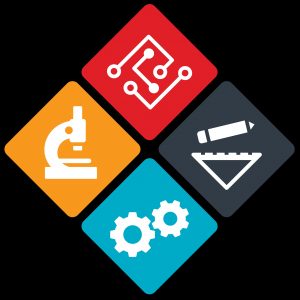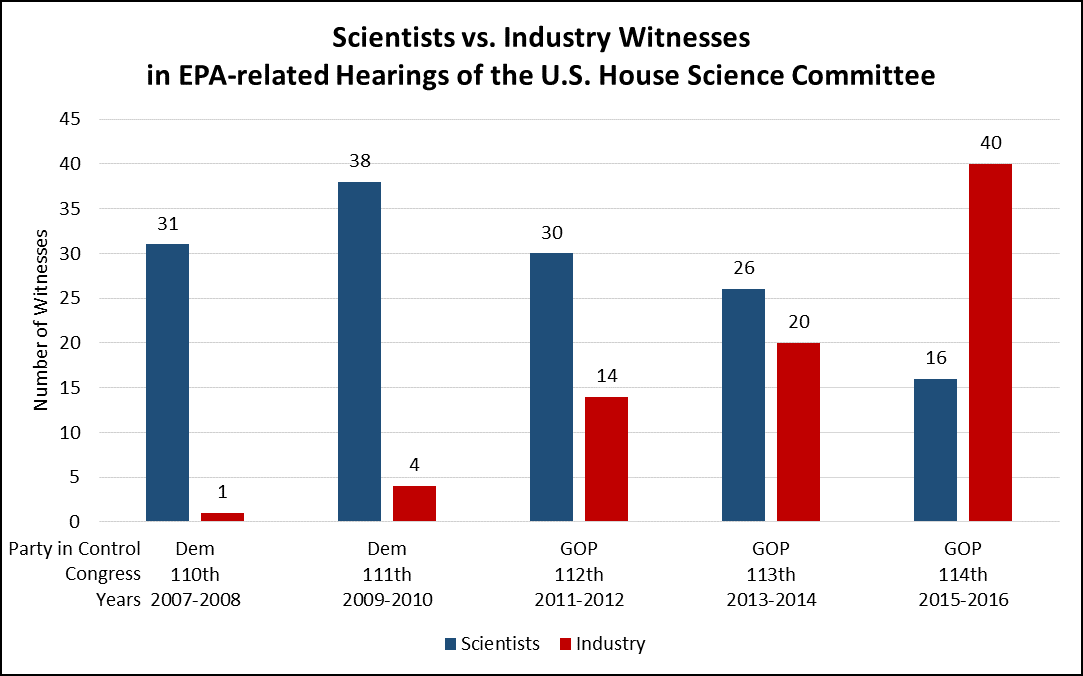
In 2015-2016, Committee Called 40 Industry Witnesses for Hearings on EPA-Related Topics, but only 16 Scientists
Washington, D.C. – With the U.S. House Science Committee planning to hold a “Making EPA Great Again” hearing today on a bill that would restrict EPA’s use of science, a review of the committee’s records shows that it has called increasingly fewer scientists as witnesses under Republican control in recent years.
The House Science, Space and Technology Committee, chaired by U.S. Rep. Lamar Smith (R-Texas) called 40 lawyers, lobbyists and other non-scientists from industry for EPA-related hearings in 2015 and 2016, but only 16 scientists, committee records indicate.
By contrast, when the committee was under Democratic control, back in 2007-2008, the science committee called 31 scientists as witnesses to EPA-related hearings, and only one non-scientist from industry (see full chart and explanation below).
“If the House ‘Science’ Committee wants to make science great again, it can start by inviting actual scientists to their hearings instead of packing them with industry lawyers and lobbyists rehashing their attacks on EPA and environmental law, ” said Eric Schaeffer, executive director of the Environmental Integrity Project.
At 11 am EST today, the committee is scheduled to hold a hearing advertised as “Making EPA Great Again!” One subject of discussion will be what Chairman Smith calls his “Secret Science Reform Act,” which would have the effect of making it harder for EPA to enact pollution control regulations by throwing up bureaucratic road blocks and potentially crippling delays before the agency could use scientific evidence to craft rules.
An Environmental Integrity Project (EIP) analysis of Science Committee records shows that increasingly fewer scientists have been called as witnesses to hearings on EPA-related subjects in recent years, as more industry lobbyists and trade groups have been brought in as “experts” by Republican leadership.

In this chart, EIP defines “scientists” as witnesses with a PhD in hard sciences, mathematics, or statistics, and includes scientists that work for government, non-profits, or industry. Non-scientists representing industries include attorneys, lobbyists, and consultants, as well as trade associations and think tanks/research institutes.
For today’s hearing on “Making EPA Great Again,” the Republican majority on the committee has called three witnesses: industry lobbyist Jeff Holmstead of the Bracewell LLP firm; Kimberly White, a director at the American Chemistry Council, an industry trade group; and Dr. Richard Belzer, an independent consultant who has a public policy degree.
The Democratic minority on the panel has called as a witness Rush Holt, CEO of the American Association for the Advancement of Science. He has warned that Smith’s “Secret Science Reform Act” bill will impede EPA’s ability to use science. The bill passed the House in 2015, but was effectively blocked by Democrats in the Senate and threatened with a veto by President Obama. But with the Republican victories in November, the political landscape has shifted in favor of the bill’s passage – and Chairman Smith has proclaimed it his top priority for passage this year.
Thirty five scientific organizations and universities, including MIT, Harvard, and the University of Michigan, have warned that the “Secret Science Reform Act” could harm EPA’s ability to function. “We could foresee a situation in which the EPA would be constrained from making a proposal or even disseminating public information in a timely fashion,” because of the legislation, representatives of AAAS and the other organizations and universities wrote in opposition to the bill.
President Trump and his Republican allies in Congress have proposed regulatory rollbacks and steep cuts for EPA, threatening protections for clean water, clean air and public health.
The source of the data in the above chart is the website of the U.S. House Committee on Science, Space, & Technology, which can be found at: https://science.house.gov/legislation/hearings.
The Environmental Integrity Project is a 15-year-old nonprofit, nonpartisan organization, based in Washington D.C., dedicated to enforcing environmental laws and holding polluters and governments accountable to protect public health.
Media Contact: Tom Pelton, Environmental Integrity Project (202) 888-2703 or tpelton@environmentalintegrity.org
###


